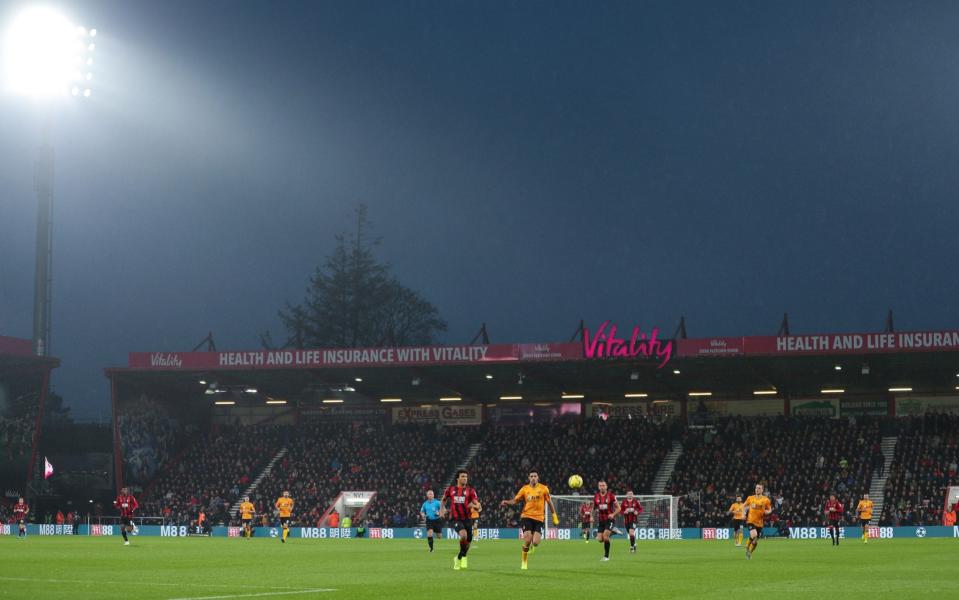Special report: How the Telegraph made Premier League clubs reduce plastic waste in sustainability drive

Premier League clubs have taken major steps to cut their plastic waste since the Daily Telegraph launched a Government-backed manifesto to pressurise them into becoming greener, it can be revealed.
A year after an investigation by this newspaper laid bare how slow the world’s richest league had been to respond to Whitehall environment targets, a second detailed audit of England’s top flight has found decisive action has since been taken on several fronts.
Much of the progress made is in line with a six-point manifesto devised by the Telegraph in consultation with campaigners and supported by the Government, which piled pressure on clubs to clean up their acts and encourage their fans to adopt greener lifestyles.
One of the manifesto’s key pillars was the phasing out of single-use plastic, pollution from which Sir David Attenborough has branded an “unfolding catastrophe” for the planet and which Britain last year committed to eliminating entirely by 2042.
Last year’s research by the Telegraph indicated the majority of Premier League sides had not set clear targets for eradicating their use of such plastic. However, 12 months on, the picture appears entirely transformed.
Of the 19 clubs to respond to this year’s audit – only Aston Villa did not – all said they had already begun phasing out single-use plastic, with many providing details of their future plans to eliminate it altogether.
Liverpool, Manchester City, Chelsea, Everton, Leicester City, Southampton and Watford said they had now rolled out reusable cup schemes, which sees drinks cups sold on match-days collected, washed and reused. Tottenham Hotspur, Bournemouth and West Ham United said they had trialled such a scheme, with the latter adding they were working towards rolling one out.

Newcastle United eradicated single-use plastic from their training ground and academy back in March, while Brighton & Hove Albion said the last year had seen them replace plastic cups with biodegradable ones, and Norwich City said they had also begun rolling out plastic-free ones.
In September, Friends of the Earth launched a campaign calling on football clubs to give single-use plastic the boot, having estimated six million such cups were used in the Premier League last season alone. It told the Telegraph it had been speaking with a number of top-flight teams about eliminating the cups altogether by the start of next season.
Its plastics campaigner, Julian Kirby, said: “Earlier this season, a survey for Friends of the Earth revealed that over four-fifths of football fans agreed that Premier League clubs should introduce reusable cup schemes, so we are delighted that many stadiums are now doing this.”
The Telegraph’s latest audit also found progress in other areas in line with its green manifesto.
Nearly all clubs to respond said they now offered vegetarian and vegan options – which have a lower carbon footprint – to all supporters, compared with less than a handful last year.

Bournemouth and Sheffield United both said they had recently installed LED floodlights. Everton said they were exploring retrofitting electric car-charging points, which would also be included at their proposed new stadium. Palace said such points were part of their Main Stand development plan, while Leicester said they would also be included in any future stadium development.
Arsenal, who also said they were looking to install charging points at the Emirates Stadium, were the only club to confirm they expected to reduce by two the number of league matches flown to this season. However, Southampton did say they were reviewing their travel routine for away games and Wolves said they only flew to one league match anyway.
No club indicated they had installed additional solar panels since last year’s audit, while just Bournemouth said they had increased their number of secure cycle storage points.
Meanwhile, Manchester United, Arsenal and Chelsea were the only sides to make it easy to find an up-to-date environment policy online.

There is no sign of the Premier League forcing its clubs to meet minimum standards on the environment, with the Telegraph revealing last year that it had decided against issuing blanket rules due to variations in the standard of stadia and facilities.
A Premier League spokesman said: “Sustainability is of great importance to the Premier League and our clubs. Progress is being made and clubs are implementing new and more efficient ways of operating – such as reducing single-use plastic in stadia, reviewing suppliers and contractors and looking at energy sources and modes of transport used.
“Lots of progress has already been made but there is more to be done and we are committed to raising awareness of sustainability and encouraging positive action.”
Kirby added: “It’s encouraging to see a number of clubs taking green issues seriously and introducing measures to cut climate-wrecking emissions, ditch single-use plastic and reduce waste – but with the world in the midst of an environmental crisis we need every club to act.”

 Yahoo Sport
Yahoo Sport 





































